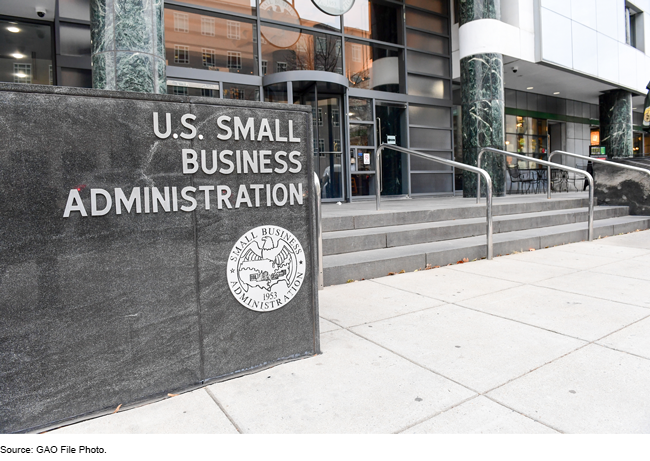Small Business Administration: COVID-19 Loans Lack Controls and Are Susceptible to Fraud
Fast Facts
Through its Paycheck Protection Program and Economic Injury Disaster Loans, the Small Business Administration has provided about $729 billion to small businesses hurt by COVID-19.
SBA streamlined the programs to speed fund distribution. However, this meant less oversight and left the programs more susceptible to potential fraud. There have been reports of fraud in both programs.
This testimony discusses the need to identify and respond to fraud risks associated with these programs. Proactively managing fraud risks, even during emergencies, helps ensure that taxpayer dollars and government services serve their intended purposes.

Highlights
What GAO Found
In April 2020, the Small Business Administration (SBA) moved quickly to implement the Paycheck Protection Program (PPP), which provides loans that are forgivable under certain circumstances to small businesses affected by COVID-19. Given the immediate need for these loans, SBA worked to streamline the program so that lenders could begin distributing these funds as soon as possible. For example, lenders were permitted to rely on borrowers' self-certifications for eligibility and use of loan proceeds. As a result, there may be significant risk that some fraudulent or inflated applications were approved. Since May 2020, the Department of Justice has publicly announced charges in more than 50 fraud-related cases associated with PPP funds. In April 2020, SBA announced it would review all loans of more than $2 million to confirm borrower eligibility, and SBA officials subsequently stated that they would review selected loans of less than $2 million to determine, for example, whether the borrower is entitled to loan forgiveness. However, SBA did not provide details on how it would conduct either of these reviews. As of September 2020, SBA reported it was working with the Department of the Treasury and contractors to finalize the plans for the reviews. Because SBA had limited time to implement safeguards up front for loan approval, GAO believes that planning and oversight by SBA to address risks in the PPP program is crucial moving forward.
SBA's efforts to expedite processing of Economic Injury Disaster Loans (EIDL)—such as the reliance on self-certification—may have contributed to increased fraud risk in that program as well. In July 2020, SBA's Office of Inspector General (OIG) reported indicators of widespread potential fraud—including thousands of fraud complaints—and found deficiencies with SBA's internal controls. In response, SBA maintained that its internal controls for EIDL were robust, including checks to identify duplicate applications and verify account information, and that it had provided banks with additional antifraud guidance. The Department of Justice, in conjunction with other federal agencies, also has taken actions to address potential fraud. Since May 2020, the department has announced fraud investigations related to the EIDL program and charges against recipients related to EIDL fraud.
Why GAO Did This Study
SBA has made or guaranteed more than 14.5 million loans and grants through PPP and EIDL, providing about $729 billion to help small businesses adversely affected by COVID-19. However, the speed with which SBA implemented the programs may have increased their susceptibility to fraud.
This testimony discusses fraud risks associated with SBA's PPP and EIDL programs. It is based largely on GAO's reports in June 2020 (GAO-20-625) and September 2020 (GAO-20-701) that addressed the federal response, including by SBA, to the economic downturn caused by COVID-19. For those reports, GAO reviewed SBA documentation and interviewed officials from SBA, the Department of the Treasury, and associations that represent lenders and small businesses. GAO also met with officials from the SBA OIG and reviewed OIG reports.
Recommendations
In its June 2020 report, GAO recommended that SBA develop and implement plans to identify and respond to risks in PPP to ensure program integrity, achieve program effectiveness, and address potential fraud. SBA neither agreed nor disagreed, but GAO believes implementation of this recommendation is essential.
